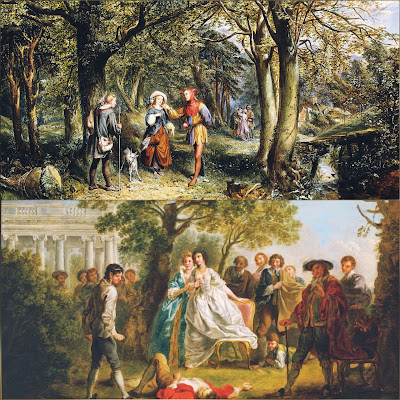Also Read
Shakespeare's dramatic play's are often exposed towards the terms of opposition, and As You Like It is no exception. Odds between the two avenues of life are seen on various stages : (1) Social norms associated with civilized society of court life are compared with the value of simple living in the forest of Arden; (2) Familial animosity that sets brother against brother and parent against a child are portrait in both spheres of living; (3) Personal contrast in between courtships and forest dwellers are based on genuine emotion as Orlando and Rosalind and those which are based on formal conventions as Silvius and Phebe.
 |
| Court & Country |
In As You Like It Shakespeare has romantically presented the two worlds - one is set in the court of Duke's and the other one is set in Arden, the ideal natural atmosphere of the forest. Throughout the entire drama, all the major and important incidents are shown taking place either in the court of Duke Frederick or in the pastoral shelter of Duke senior. Both the world are connected through the chain of events. We see that there are clashes and bitter fight quarrels between two brothers, the wrath of Duke Frederick, the wrestling match the court love, and undeserved punishments of tender maidens. All these incidents are found taking place inside the glamour or glory of court.
On the other hand, we have a true idyllic presentation of the forest of Arden, where people take their refuge, where everything is good and colorful where simple lustiest characters make love to each other forgetting their worries and tensions. In the play we see that banished from the court Rosalind and Celia, Oliver and Orlando, Touchstone, and many others have found their desired shelter in the bosom of nature. There are found no fortunes from the court, no tensions from the Duke's, no fear of banishment. It is the land of dreams where all the natural creatures including human beings are found completely at peace with each other. That pastoral shelter has been compared with the court life as a kind of Eden in the play. Thus William Shakespeare has presented the two separate worlds in the drama and presented in a fine texture.
Closely allied with the opposition of court life and the Forest of Arden is the dichotomy between fortune and nature. Here, 'fortune' represents both material gain - achieved through power, birthright, or possessions and a force that unpredictably determines events. "Nature," on the other hand, is both the purifying force of Arden and humanity's fundamental condition stripped of the trappings of wealth, power, and material possessions.
The opposition between fortune and nature is highlighted most in the first act, where the audience finds that fortune has benefited the villainous (Frederick and Oliver) over the virtuous (Duke Senior, Orlando, and Rosalind). Celia suggests that she and Rosalind "mock the good housewife Fortune from her wheel, that her gifts may henceforth be bestowed equally", referring to the fact that the goddess Fortune was historically depicted as blind, sitting on a spherical throne, with one foot on a ball and one hand upon her wheel that determined the fates of everyone. The goddes Nature, meanwhile, was considered to be in control of people's innate virtues, such as their nobility and wisdom. In this scene, Rosalind and Celia discuss Fortune and Nature at length, musing on the two goddesses' effects on the world.
Duke Senior is presented as a man who has successfully thwarted Fortune; after his speech praising the rustic over the courtly life, Amiens notes, "Happy is your Grace That can translate the stubbornness of fortune Into so quiet and so sweet a style". Fortune is mentioned again later by Adam, who, upon fleeing with Orlando, notes, in a rhyming couplet closing a scene, "Yet fortune cannot recompense me better than to die well and not my master's debtor". Nature, meanwhile, is invoked most pointedly when Oliver describes his brother's rescue of him: "But kindness, nobler ever than revenge and nature, stronger than his just occasion, Made him give battle to the lioness, Who quickly fell before him". Thus, the play's protagonists by and large manage to overcome the caprices of Fortune by drawing on the assets of Nature.